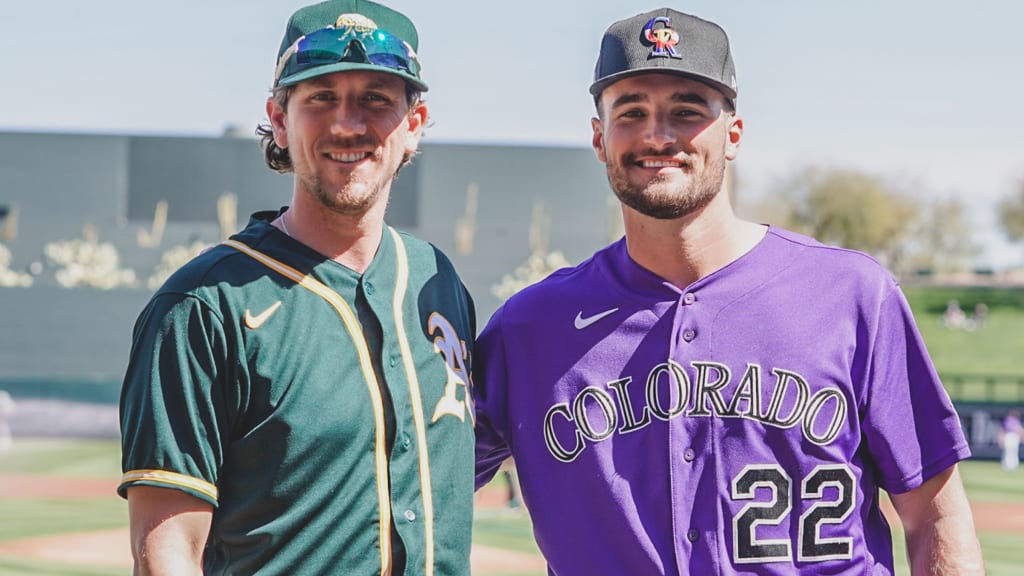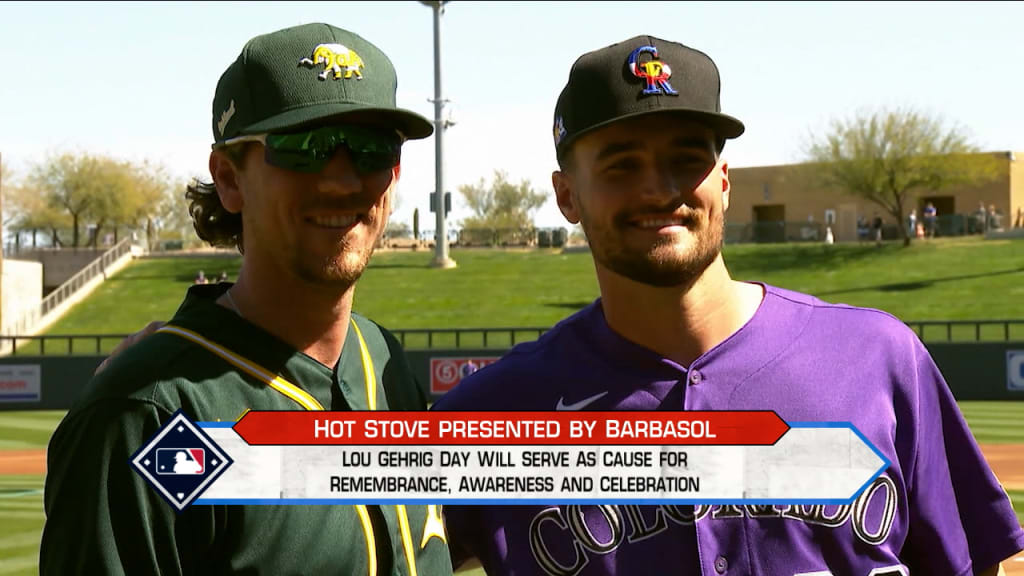Piscotty, Hilliard bonded in fight against ALS
This browser does not support the video element.
Their meeting on the field was brief. A hello, some small talk, a photo. Then, with a game to play Wednesday at Salt River Fields in Scottsdale, Ariz., A’s outfielder Stephen Piscotty and Rockies outfielder Sam Hilliard retreated to their respective dugouts and their respective rooting interests.
But Piscotty and Hilliard are teammates in a very different sense, bonded by one of science’s most brutal and bewildering unanswered questions. Within one year of each other, in 2017-18, Piscotty’s mother, Gretchen, and Hilliard’s father, Jim, were diagnosed with amyotrophic lateral sclerosis (ALS), the rare and fatal condition more commonly known as Lou Gehrig’s Disease.
So as Major League Baseball unveils plans to celebrate Gehrig’s legacy and raise awareness of ALS with the inaugural Lou Gehrig Day on June 2, these sons of the afflicted share a pain and an understanding of how this awful illness impacts more than 16,000 living Americans and their families.
“It’s a bond I wish we didn’t have,” Piscotty said. “You just wish the circumstances were different and that you weren’t getting to know someone through that. But it’s good for me, and hopefully for him, to share in some of the emotion.”
Piscotty’s mother passed away in May of 2018, one year after her diagnosis.
For Hilliard’s father, who was diagnosed in early 2018, the fight rages on.
“It’s been a really tough road to have to navigate for my family,” Hilliard said. “It’s brought us closer together and shown great qualities about my father about how he is resilient and always positive. Every second we have together is precious.”

Lou Gehrig Day will be held 80 years to the day after Gehrig’s death in 1941. Yet for all the time that has passed since the Yankees legend became the most famous victim of ALS, significant scientific advancement in treating the condition has not been achieved.
ALS remains incurable, and the mean survival time after diagnosis is three to five years.
The disease is often associated with baseball purely because of Gehrig. But ALS also took the life of another Hall of Famer, Jim “Catfish” Hunter.
And Hilliard, Piscotty and Brewers catcher Jacob Nottingham, who has lost six extended family members -- including his grandmother, Nancy, and his aunt, Laurie -- to ALS, can unfortunately attest to its current connection to the sport.
“I stand with other families across the globe in praying for a cure,” said Nottingham, who has a large tattoo on his left arm depicting Gehrig looking down on his grandmother and aunt. “Together, we can fight this and ultimately find that cure.”
For these players and so many others, Lou Gehrig Day offers a sense of hope. Like the Ice Bucket Challenge -- the 2014 social media campaign that raised more than $220 million worldwide to support ALS research -- it is an opportunity for an underfunded cause to reach a wider audience.
Piscotty, along with his father, Mike, created the ALS CURE Project to sponsor further research.
This browser does not support the video element.
“Because ALS is so rare, some of the research being done is good but sporadic,” Piscotty said. “We want to get everyone on the same gameplan. Hopefully, through this day, people can learn about us and our process, and get people who want to work together.”
Piscotty’s mother declined rapidly after her diagnosis. Thankfully, the December 2017 trade that sent Piscotty from the Cardinals to the A’s allowed him to be near his Pleasanton, Calif., hometown and spend invaluable hours with Gretchen in her final months.
“One night, something was going wrong, and she wasn’t able to communicate verbally,” Piscotty recalled. “I spent all night in the emergency room with her. While that was a tough night, that’s where I wanted to be, at the side of her bed. Looking back on it, I’m so grateful for that trade, because it allowed me to be there for that.”
Piscotty’s home run in his first at-bat after his mother’s funeral was as goosebump-inducing a moment as baseball can provide. But he has another memory that is every bit evocative.
This browser does not support the video element.
He thinks back to high school, when he had to complete a biography project that involved a presentation in front of his English class. Writing and public speaking did not come naturally to him, so he put a tremendous amount of time into the assignment. And Gretchen, an attendance secretary at the school, dutifully helped her son edit his paper and prepare his speech.
The subject? Lou Gehrig.
“It gives me chills to think about that now,” Piscotty said.
Piscotty’s wife, Carrie, is due to give birth to the couple’s first child in April, and the baby boy will not get to meet his grandmother. But they are connected through blood and through song. When Stephen was in Gretchen’s womb, she would wind a music box that played “Amazing Grace” for her unborn son. When Gretchen was in the final stages of her battle with ALS, Piscotty would pick up his guitar and play her that same hymn.
Today, he plays it for the little boy growing in Carrie’s belly.
Hilliard, meanwhile, is still blessed to have his father in his life for however long ALS allows. But watching his dad’s gradual decline -- from initial numbness in his hand during a round of golf to the heartbreaking diagnosis to all that has followed -- has been agonizing.
“I’ve always seen my dad as a very strong-willed, independent, hard-working guy,” Hilliard said. “When he was diagnosed, it was hard to imagine what it was going to be like. For several months, at the beginning, it seemed like there was nothing wrong. But it’s a gradual thing, and it’s still going.”
Over time, ALS patients lose their ability to walk, to talk, to eat.
What they don’t lose is their love for those closest to them.
So while the Hilliards endure the progressive pain of Jim’s condition, they’ve learned to appreciate the moments, big and small, that they have left together. And few moments were more meaningful than the day last July when Sam’s parents, Jim and Tamara, and his then-fiancée (now wife), Kat, were able to attend his first Opening Day in the big leagues, despite the coronavirus restrictions. Hilliard’s family members were the only people in attendance in the first game at Arlington’s Globe Life Field, near his Mansfield, Texas, hometown.
“The Rangers were extremely, extremely accommodating to my family,” Hilliard said. “It was just such a really cool experience, something I’ll never forget.”
This browser does not support the video element.
When Hilliard’s father was initially diagnosed, the young outfielder wanted to keep it quiet.
“It was uncomfortable and just a weird thing to talk about,” Hilliard said. “But I’ve realized recently that I do have this platform, and I would be doing a disservice to my father and others that are suffering if I didn’t help bring awareness to it. That’s what my dad wants, and I know what people are going through. So it’s the very least I can do.”
This, more than a celebration of Gehrig’s unquestionably great baseball career, is the essence of Lou Gehrig Day. It’s not just about honoring a legend; it’s about advancing a cause. The ALS Association has found that more than 60% of Americans don’t know a thing about ALS.
And yes, that includes many of us who did the Ice Bucket Challenge.
“I did it,” said Piscotty, “and I didn’t even really know what [ALS] was, really.”
So the Lou Gehrig Day announcement arrives, hopefully, like a splash of cold water to the head. A wake-up call to millions of baseball fans who hear the term “Lou Gehrig’s Disease” and don’t truly think about its implications for those affected.
In Gehrig’s game, there are present-day players very much affected by this deadly illness. And their team needs our support.
To learn more about amyotrophic lateral sclerosis, visit <a href="https://www.als.org/" target="_blank" >als.org.
